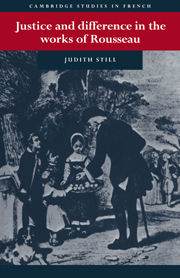Book contents
- Frontmatter
- Contents
- Acknowledgements
- A preliminary note on vocabulary and conventions
- Introduction
- Chapter 1 The problem: the intersection of beneficence and pudicity
- Chapter 2 The code of beneficence
- Chapter 3 The practice of beneficence and model benefactors in the major works
- Chapter 4 The passion of pity in Rousseau's theory of man
- Chapter 5 Gyges' ring: a reading of Rousseau's 6e Promenade
- Chapter 6 Pudicity in some of Rousseau's minor writings: its relationship to beneficence
- Conclusion
- Appendix: Generosity and pudicity in Gyges und sein Ring and Le Roi Candaule
- Notes
- Bibliography
- Index
- Cambridge Studies in French
Chapter 3 - The practice of beneficence and model benefactors in the major works
Published online by Cambridge University Press: 22 September 2009
- Frontmatter
- Contents
- Acknowledgements
- A preliminary note on vocabulary and conventions
- Introduction
- Chapter 1 The problem: the intersection of beneficence and pudicity
- Chapter 2 The code of beneficence
- Chapter 3 The practice of beneficence and model benefactors in the major works
- Chapter 4 The passion of pity in Rousseau's theory of man
- Chapter 5 Gyges' ring: a reading of Rousseau's 6e Promenade
- Chapter 6 Pudicity in some of Rousseau's minor writings: its relationship to beneficence
- Conclusion
- Appendix: Generosity and pudicity in Gyges und sein Ring and Le Roi Candaule
- Notes
- Bibliography
- Index
- Cambridge Studies in French
Summary
In this chapter I am going to analyse a number of representations of the relationship between benefactor and beneficiary in Rousseau's work. I consider these first of all on Rousseau's terms to see how he uses the moral code as a standard against which interpersonal relationships can be judged. Second, I analyse them ‘against the grain’ in terms of sexual difference. It is not too much of an exaggeration to say that wherever there is a hierarchy the tradition of western thought has somewhere added femininity to the characteristics loosely associated with the inferior party. Aristotle is – as I have indicated in Chapter 2 – a source for such oppositions; he associates activity with the strong and powerful benefactor, and passivity with the weak and lacking recipient. In the Aristotelian tradition it is clear that the beneficiary is less of a man than the benefactor – even though real women are usually not even considered as potential beneficiaries.
In Rousseau's confessional works, however, the situation is more complex: the young Rousseau is a feminised figure in a series of engagements with male and female individuals who variously act as benefactors, false benefactors, malefactors and lovers. He plays the coquette with the Curé de Pontverre who, an experienced seducer, makes him keep his promise to convert to Catholicism. He is the more or less helpless victim of sexual advances from older men and women.
- Type
- Chapter
- Information
- Justice and Difference in the Works of RousseauBienfaisance and Pudeur, pp. 37 - 81Publisher: Cambridge University PressPrint publication year: 1993



